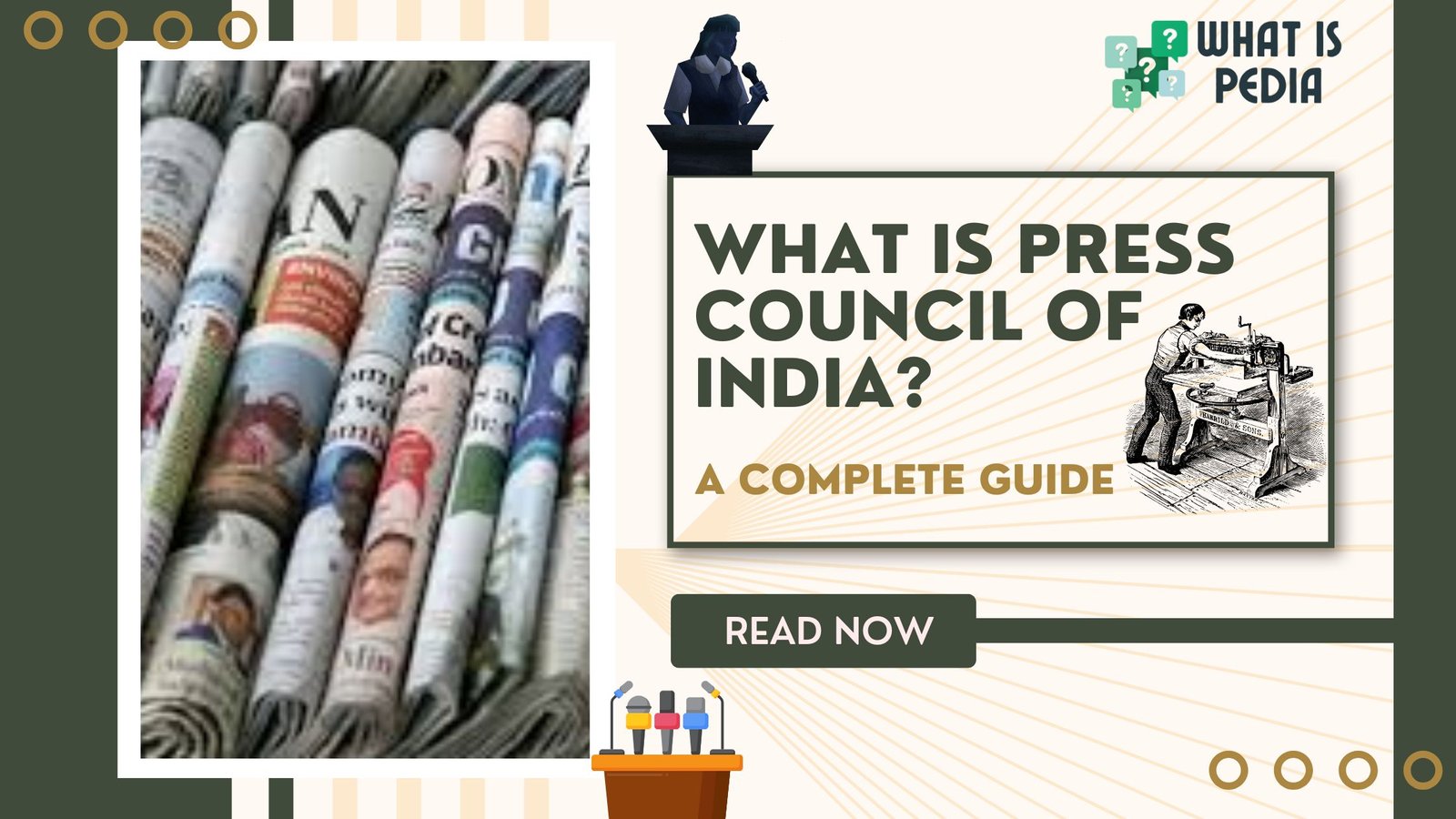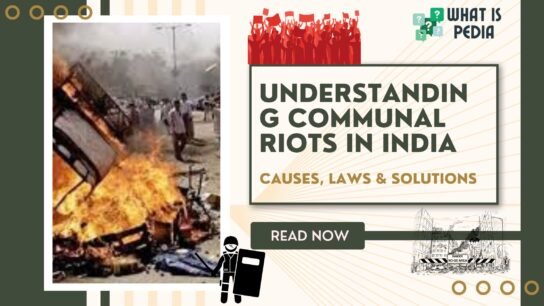Introduction
Understanding Press Regulation
The press has always played a crucial role in shaping public opinion and keeping the government accountable. It acts as the fourth pillar of democracy, ensuring that people receive unbiased and factual information. However, with great power comes great responsibility. The spread of misinformation, sensationalism, and biased reporting has raised concerns about journalistic ethics, making press regulation a necessity.
Press regulation ensures that journalistic freedom is maintained while preventing misuse of press power. Various countries have implemented different models of press regulation, some adopting self-regulation, while others have independent regulatory bodies to monitor press ethics and accountability. In India, this role is fulfilled by the Press Council of India (PCI).
What is Press Council of India?
The Press Council of India (PCI) is a statutory, autonomous, and quasi-judicial body that functions as the watchdog of the press in India. It was established to ensure that journalism remains free, fair, and responsible. The PCI protects press freedom, regulates unethical practices, and serves as a self-regulatory body for the print media industry.
Press Council Act 1978: Governing the PCI
The Press Council of India Act, 1978, governs the Press Council of India. It outlines the role, structure, and powers of PCI, ensuring that it functions independently while maintaining journalistic standards. The Act also provides the legal framework that empowers PCI to take necessary actions against journalistic misconduct, paid news, biased reporting, and violations of press ethics.
What This Blog Covers
This blog will provide a detailed analysis of the Press Council of India, covering its history, key provisions, role in journalism, powers, limitations, challenges, and future.
History of the Press Council of India
Origins of Press Regulation in India
Press regulation in India can be traced back to British colonial rule, when the government implemented laws to suppress press freedom. One of the most controversial laws was the Vernacular Press Act, 1878, which restricted Indian-language newspapers from criticizing British policies.
After independence in 1947, India embraced freedom of the press as a fundamental democratic right. However, concerns arose regarding unethical journalism, yellow journalism, and paid news, leading to discussions about press regulation.
Establishment of the First Press Council (1966)
The idea of a Press Council in India was first proposed by the First Press Commission (1954), which emphasized the need for an independent regulatory body to maintain journalistic ethics. As a result, the first Press Council of India was established in 1966 under the Press Council Act, 1965.
The primary objectives of the first PCI were to:
- Safeguard press freedom from government and corporate influence.
- Ensure responsible journalism by setting ethical standards.
- Prevent unfair practices such as biased reporting and sensationalism.
Press Council Act 1978 and Re-establishment
During the Emergency (1975-77), the Press Council of India was dissolved by the government, raising concerns about press freedom suppression. To restore press autonomy, the Indian Parliament passed the Press Council Act, 1978, which led to the re-establishment of the PCI in 1979.
This Act gave legal authority to PCI, making it an autonomous statutory body responsible for ensuring journalistic ethics and press accountability.
Press Council Act 1978: Key Provisions
Overview of the Act
The Press Council Act 1978 serves as the legal foundation for the Press Council of India. It defines its composition, powers, responsibilities, and functions. The main objective of this Act is to protect press freedom while ensuring responsible journalism.
Structure and Composition of PCI
The Press Council of India consists of 28 members, representing different stakeholders in journalism.
Composition of PCI
- Chairperson – A retired Supreme Court judge, appointed by the President of India.
- Members from the Press – Representatives from newspapers, news agencies, and journalists’ associations.
- Members from Parliament – Nominated Members of Parliament (MPs) from Lok Sabha and Rajya Sabha.
- Public Representatives – Legal experts, academics, and social workers.
Functions and Powers Under the Act
The Press Council of India Act 1978 grants PCI the following powers and responsibilities:
- Ensuring Ethical Journalism – PCI sets guidelines for journalistic integrity.
- Censuring Unethical Practices – PCI has the power to censure, warn, or admonish media organizations for violations of journalistic ethics.
- Protecting Press Freedom – PCI acts against government interference, media suppression, and censorship.
- Handling Complaints – Investigating grievances against newspapers and journalists regarding unfair reporting.
Role of Press Council of India in Journalism
Guardian of Press Freedom
The Press Council of India plays a critical role in safeguarding press freedom by ensuring that journalism remains independent, unbiased, and factual.
Maintaining Ethical Journalism
To maintain journalistic ethics, PCI:
- Prevents sensationalism in news reporting.
- Takes action against paid news and fake news.
- Ensures accountability in print media.
Addressing Complaints Against Media Houses
PCI investigates complaints related to biased reporting, defamation, fake news, and press misconduct. Several high-profile cases have been addressed by PCI, ensuring media responsibility.
Regulating Advertisement Ethics
PCI also regulates advertisements, ensuring that misleading or unethical ads are not published in newspapers.
Powers and Limitations of Press Council of India
Powers of PCI
- Investigates complaints against the press.
- Censures publications for unethical journalism.
- Advises the government on press-related policies.
Limitations of PCI
- Lack of Enforcement Power – PCI can warn or censure but cannot penalize or impose fines.
- Limited Jurisdiction – PCI only regulates print media, excluding electronic and digital media.
Challenges and Criticism of the Press Council of India
Lack of Strong Legal Backing
- PCI’s recommendations are not legally binding.
Political and Corporate Influence
- Concerns exist over PCI’s independence.
Need for Digital and Social Media Regulation
- PCI does not regulate online journalism and social media, raising concerns about misinformation and fake news.
The Future of Press Council of India
Proposed Reforms
- Expanding PCI’s jurisdiction to include digital and electronic media.
- Granting more legal powers to enforce its decisions.
Role in the Digital Age
- PCI must collaborate with tech giants to tackle misinformation and digital propaganda.
Conclusion
The Press Council of India remains a crucial watchdog for journalism, ensuring press freedom while promoting ethical journalism. However, it needs reforms to remain effective in the digital era. Strengthening its powers and expanding its jurisdiction will help PCI protect journalism and democracy in India.
FAQs on Press Council of India
1. What is the Press Council of India?
The Press Council of India (PCI) is a statutory and autonomous body that regulates print media in India. It ensures press freedom, ethical journalism, and accountability, preventing unethical practices such as paid news and biased reporting.
2. When was the Press Council of India established?
The Press Council of India was first established in 1966 but was later dissolved during the Emergency (1975-77). It was re-established in 1979 under the Press Council Act 1978 and has been functioning since then.
3. What is the Press Council Act 1978?
The Press Council Act 1978 is the legal framework that governs PCI. It defines the structure, powers, and functions of the council, ensuring that it works independently to regulate journalism and maintain press ethics.
4. What is the role of the Press Council of India?
The Press Council of India plays a crucial role in:
- Protecting press freedom from political and corporate interference.
- Ensuring ethical journalism by preventing fake news, sensationalism, and paid news.
- Addressing complaints from the public regarding unfair or biased reporting.
5. Does the Press Council of India regulate television and digital media?
No, the Press Council of India only regulates print media (newspapers and magazines). Electronic media (TV) and digital media (online news portals, social media) are not under its jurisdiction.
6. What powers does the Press Council of India have?
The Press Council of India has the power to:
- Censure or warn media houses for unethical journalism.
- Investigate complaints against newspapers and journalists.
- Issue guidelines and advisories for responsible journalism.
However, PCI cannot impose fines or legal penalties, as its powers are advisory, not punitive.
7. How does the Press Council of India handle complaints?
Anyone can file a complaint with PCI regarding biased reporting, unethical journalism, or press misconduct. PCI investigates the complaint and, if found valid, censures the publication or journalist involved.
8. Who appoints the chairman of the Press Council of India?
The Chairman of PCI is usually a retired Supreme Court judge, appointed by a committee comprising the Speaker of Lok Sabha, Chairman of Rajya Sabha, and members from the press and legal fields.
9. What are the limitations of the Press Council of India?
Some key limitations of PCI include:
- Lack of enforcement power – PCI cannot impose penalties; it can only issue warnings.
- Limited jurisdiction – It does not regulate electronic and digital media.
- Dependence on government funding, which raises concerns about its autonomy.
10. Is there a need to reform the Press Council of India?
Yes, with the rise of digital media and online journalism, PCI needs reforms to:
- Expand its jurisdiction to cover electronic and digital media.
- Have greater enforcement powers to penalize unethical journalism.
- Strengthen its independence from government influence.
11. How can the Press Council of India help in fighting fake news?
The Press Council of India monitors print media for misleading information, fake news, and unethical reporting. However, since it does not regulate online media, it has limited power in tackling fake news on social media and digital platforms.
12. Can the government control the Press Council of India?
No, the Press Council of India is an autonomous body, meaning the government cannot directly control its decisions. However, since PCI depends on government funding, there are concerns about its independence.
13. What is the difference between the Press Council of India and the News Broadcasters & Digital Association (NBDA)?
- Press Council of India (PCI) regulates print media (newspapers, magazines).
- News Broadcasters & Digital Association (NBDA) regulates TV news channels and digital news platforms.
14. How does the Press Council of India differ from the Advertising Standards Council of India (ASCI)?
- PCI regulates journalistic content in newspapers and magazines.
- ASCI regulates advertisements to ensure they are not misleading.
15. What is the future of the Press Council of India?
The future of PCI depends on how it adapts to the changing media landscape. There are ongoing discussions about:
- Expanding PCI’s jurisdiction to cover digital and electronic media.
- Strengthening its legal authority to enforce its rulings.
- Enhancing its role in tackling fake news in the digital era.
🚀 Read More: Rights of Consumer Protection Act: Understanding Consumer Rights in India







